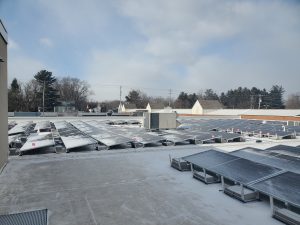By: Brendon Smith, Director of Marketing and Communications
Willy West Gets Solar panels
We’ve had solar panels on the roof of Willy East for almost a decade, and now we also have solar panels at Willy West—and many more of them! This project was a little trickier than our last one because Willy East is the only building that we own—we lease our other stores, office, and kitchen, as well as Aubergine. We’re appreciative that our landlord at Willy West was open to the installation of the solar array, and now we and our community are reaping the benefits of even more clean solar energy.
In early January of 2023, we reached out to Legacy Solar Co-op (LSC) to discuss a solar panel array installation at Willy West. We had previously partnered with LSC on the solar array at Willy East, and had been pleased with the results. The Sixth Cooperative Principle is “Cooperation Among Cooperatives,” so it was a natural choice to work with LSC.
How does the “co-op” part apply to LSC? They’re also a membership-based organization; in their case, membership supports their mission to build a sustainable legacy that helps protect the earth through the growth of solar energy. Some institutions (like Willy Street Co-op) can’t take advantage of the tax credits available to other organizations that install solar panels. We likely would not have been able to add solar panels on the roof of any of our locations if we had to pay the full cost. That’s where LSC comes in. Legacy Solar Co-op finds projects that need funding and matches them with tax sponsors. Then they raise a portion of the financing through issuing co-op bonds to their members who want to invest in growing solar in Wisconsin—similar to the Owner Bonds we offered when we wanted to expand a store or open a new one. It’s a way to invest in your co-op and in your community. LSC’s Slice-of-Sun Solar Bond program facilitates community solar projects up front or in the first year of the project’s development.
After working out the details with LSC, Full Spectrum Solar helped us to source and install the solar panels. We completed the installation over the last few months and are now generating solar power at Willy West. We expect this to generate about 165,000 kWh/year, or about 22% of that store’s yearly electricity bill.
I asked General Manager Anya Firszt why this project was a priority for our Co-op. “Solar energy is a renewable energy source that is good for the wellness of the planet and aligns with our Strategic Plan,” she said. “Additionally, it will reduce our future energy costs.” The Co-op is also an investor in the O’Brien Solar Fields in Fitchburg, a 20-megawatt array utilizing over 60,000 bifacial solar panels.
Environmental Impact Metrics
On the Our Sustainable Practices webpage (willystreet.coop/sustainability), we’ve started to track some environmental impact metrics—see below for Fiscal Year 2024 (ending June 30, 2024). We’ll update these each year going forward and work on ways to improve the metrics.
Focus Area | Amount | Why Are We Tracking This? |
Electricity use | 2,850,090 kilowatt hours | Reducing electricity use (including through using LED lights, energy-efficient equipment, etc.) means less energy from coal-fired power plants as well as a lower energy bill. |
Natural gas use | 53,637 BTUs | Natural gas is mostly methane, a greenhouse gas, and is extracted via drilling and fracking. |
Water use; includes bulk water sales | 3,444,483 gallons | More efficient use of water for business uses keeps more fresh water for other uses. |
Refrigerant use | 365 pounds | Traditional refrigerants harm the Earth’s ozone layer and can contribute to global warming. |
Solar power generated at Co-op sites | 26,910 kilowatt hours | We want to increase the amount of electricity we get from solar power rather than coal-fired power plants. (This amount does not include energy generated from the O’Brien Solar Fields.) |
Local product sales | $22,086,997 | More local food means less transportation for the food, less reliance on Big Food, and more money in our local economy. More information at willystreet.coop/local. |
Certified organic sales in Bulk, Meat & Produce departments | $1,631,807 | More organic food means fewer pesticides, and better land and water stewardship. |
Compost | 260,540 pounds | The most sustainable way to divert organic waste from landfills is to turn it into compost and use it to grow food! |









